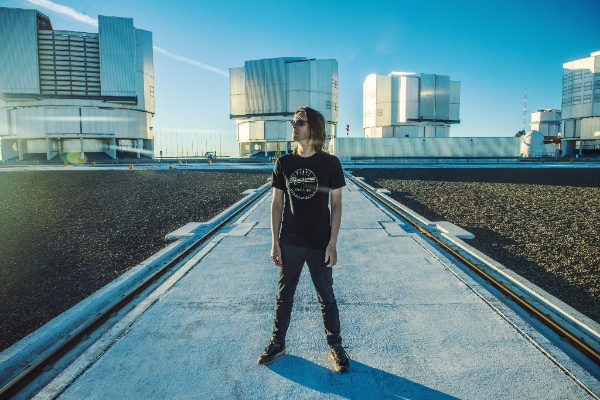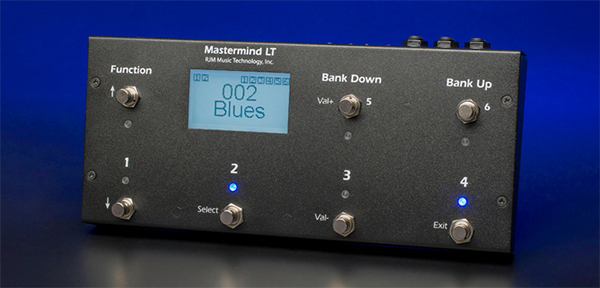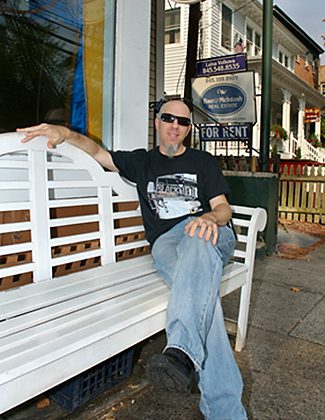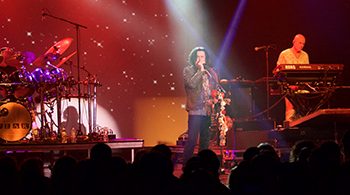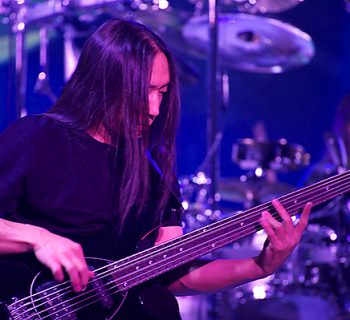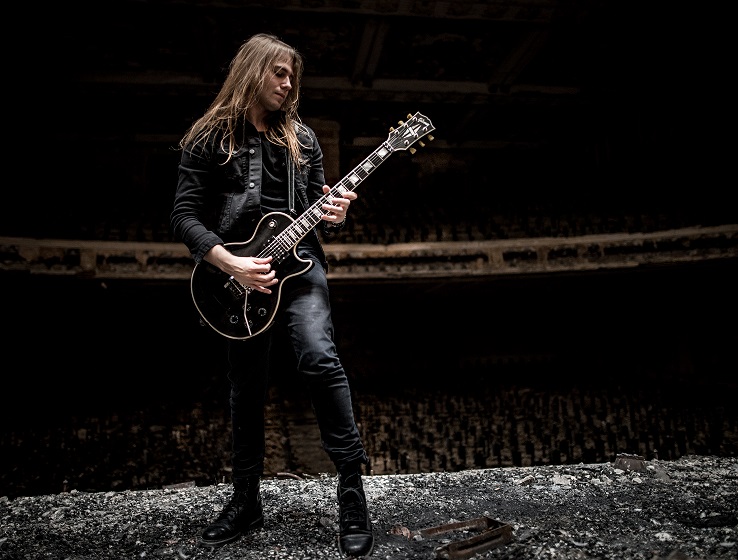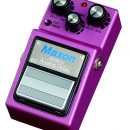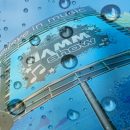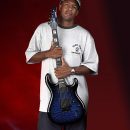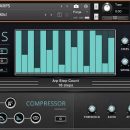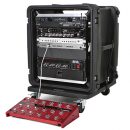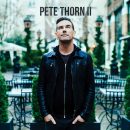Steven Wilson is known worldwide as the mastermind behind the progressive rock band, Porcupine Tree, collaborator with Israeli pop star Aviv Geffen in the rock band, Blackfield, and as one of today's preeminent songwriters for his highly acclaimed solo work.
On Wilson's latest solo record, To The Bone, fans find the humble songwriter embracing a happier and less progressive musical perspective compared with the darker underpinnings of much of his previous work. Here, Wilson incorporates elements of his '80s new wave and rock influences and serves them up in a modern way that proves to be catchy, melodic, and as always, definitively Steven Wilson. He also found time to contribute to the latest Blackfield album, a project many fans thought may have fallen by the wayside given Wilson's busy writing/touring/producing/mixing schedule.
Fortunately, there was some time in Wilson's busy schedule for us to talk about all this, so let's get right to the bone. Err, we mean, to the interview, of course!
“I don't think I've ever written such a convincing piece of joyous pop as that song.”
MPc: To The Bone forges a new musical path, embracing the artists of your youth, but with your modern aesthetic. What you were going for with making of the new record?
SW: I think the press really focuses on this idea of the '80s and the fact that there was a strong influence from the '80s in the record. But, actually, really the only strong influence is the idea that that particular era, the '80s, were an era when I think there was a very strong trend towards making albums which were both ambitious but also very accessible. And when you think of those artists from that era—people like Prince, Kate Bush, Peter Gabriel, Tears for Fears, Talk Talk, those kind of artists—what was really special about a lot of those albums is that they were very, very easy to enjoy. You know, they had big hit singles on them and there were very catchy choruses and all this.
But at the same time, there was no sense of dumbing down. That if you wanted to engage with the albums at a much deeper level, whether it was the lyrics or the musicianship or the very cinematic production, that was all there, too.
So I kind of took that as a starting point—the idea that you could still make records like that, as a starting point. I wanted to focus a lot more on the art of songwriting and melody, but still in the context of what I hoped was very cinematic and very ambitious arrangements and production.
So that's where To The Bone came from, that kind of impulse to do something which was a lot more focused on my songwriting but wouldn't sacrifice any of the ambition and sophistication that people recognize—I guess people hopefully recognize—from my sound.
MPc: That '80s affinity leads beautifully into the fact that Andy Partridge had some involvement with you on this record.
SW: Yeah, Andy's someone I've gotten to know, I've been very fortunate to get to know over the last few years, because I've been remixing the XTC back catalog into surround sound and stereo. And Andy's a lovely guy, really very passionate about music, as anyone that's met him will know. And being one of my favorite songwriters, it was almost inevitable that at some point I would call him up and ask him to collaborate with me on a song.
And on this record, it's actually the title track, and it was really a song that I knew what I wanted it to be about, but I really didn't know how to go about writing it. And so it was obvious to me that that was the moment to call up Andy and say, "Hey, Andy, I've got this song. Do you want to do the lyrics?" And so he did, and what a privilege and an honor! It kind of… it's one of those moments when it feels like everything's come full circle for me. Because I grew up listening to Andy and his songwriting, and songwriting is the very core of this album, and Andy is in the mix, too. So that's amazing.
MPc: Now that you mention that, it makes me think, you know, Ninet Tayeb had a great vocal appearance on your album, but, gosh, maybe you should have asked Kate Bush! [laughs]
SW: Yeah. She's the sort of person that probably gets an invitation every other day to work with somebody, you know? I've approached Kate's management about remixing her catalog into 5.1 many times and never managed to get very far. But, yes, wouldn't that be a dream, to work with Kate Bush, yeah.
MPc: I noticed you've got quite a different lineup of musicians on the new record. Obviously Nick Beggs and Adam Holzman stand out to me, of course, from your band. But there are a lot of other new guys. Tell me about the performances and musicians' roles on the new record.
SW: This was a much more experimental record. Even though it's got this more accessible slant to it, the way I went about making this record was actually a lot more experimental because the last couple of records I've done basically by just going to the studio for a week each time, with a band that already knew and rehearsed the material.
And this time it's actually much more of a… although, you're right, there are other musicians involved—it's actually much more of a solo record in the sense that I play a lot of the guitar myself, a lot of the bass, a lot of keyboards.
So the other musicians were brought in at various points during the process, but it was usually a case of thinking about each song and trying to imagine a different kind of musical world for each of the songs to exist in.
So, for example, having Andy contribute to one of the songs lyrically, but also having someone like Mark Feltham, the harmonica player, come in and play harmonica on a couple of songs. And Mark is someone that I knew from his work on those '80s Talk Talk records. And, if you know those records, you know that a harmonica is a very big feature.
So I wanted to get that sound on a couple of songs. And then I wanted a slightly different vocal approach on one of the songs, a song called "Song of I." And I wanted someone that would have a more, kind of a sinister, but still very sensuous, vibe to that song. And I was recommended this singer called Sophie Hunger. And so that's how Sophie got involved.
And then there's different drummers on different tracks depending on the kind of drumming I wanted. I think it was more a question of taking each song as an individual entity and kind of figuring out who were the right people to play on it. And sometimes that was just me. Would I want to play the bass on this myself, you know? Or play the keyboards on this myself?
And that's obviously a very different approach to the previous couple of records where essentially, they've been band records. The same lineup on every song. So, I think that's another thing that gives the record a different kind of complexion and sound this time around.
MPc: I found this album hitting me somewhere between Porcupine Tree's Stupid Dream and Blackfield V, which I also want to talk with you about . One of the things I found really enjoyable was this juxtaposition you had with the acoustic piano and acoustic guitar against electronic sounds and textures. What was your thought process, once you sat down and started writing these songs?
SW: Of course you're right, there is that going on. You know, it's not something I really intellectualize. Obviously, it's a big part of my musical DNA that I love both acoustic sounds and electronic sounds. I'm a big fan of electronic music, I listen a lot to a lot of electronic music. But I also like very organic sounds and obviously I like the juxtaposition of those.
One of the things I think that's interesting is sometimes when you come to talk about music in retrospect, when people ask questions like you've done, which is a perfectly valid question, is that you suddenly think to yourself, well, I guess I did do that, but it never struck me as something I was doing consciously or it never struck me as something I was… that other people might consider to be unusual or innovative in any way. And I'm not saying it is innovative, because there's lots of people obviously do similar things.
I guess everything I do—I think this is the answer to your question—everything I do is a natural consequence of my musical DNA. And I love electronic music and I love acoustic music. It never seemed strange to me that they shouldn't go together. In fact, quite the opposite, it seems very natural to me that they should go together.
So I don't know if that answers your question or not. It's not something I really intellectualize. I think you asked the question, was it deliberate? Of course it was deliberate. But it wasn't like a manifesto or anything like that. It was just something very natural that comes about because of my own musical diet and musical preference.
MPc: Do you have any particular favorite track on the new record?
SW: Well, I always think—as you know, I'm sure we talked about this before when we've spoken—I always think about records as musical journeys, and I always think of them as a sort of musical continuum. And I don't necessarily think of them as individual tracks. It's a whole musical experience.
But, having said that, I wouldn't say it's my favorite track, but one of the tracks I'm most proud of because it's so different for me—I'm sure you can guess which song I'm going to say: "Permanating." Because, I don't think I've ever written such a convincing piece of joyous pop as that song. And, in that respect, because it's so different for me and because I'm so proud of it and I think it's so different and it's something that I'm not—let's just say I'm not falling back on my clichés now. I'm actually putting myself in some ways outside of my comfort zone. And for it to come off and to be so successful, at least in my opinion, so successful as a very convincing piece of joyous pop music, I think that one is something I feel particularly proud of, yeah.
MPc: That brings to mind a thought that is often discussed among my own bandmates, hailing from a progressive rock background, but writing more commercially-minded material now. And the thought is this: it's harder to write a good pop song than a good progressive rock song. What do you think about that statement?
SW: Yeah, a sentiment I can completely concur with, totally.
It's very easy, actually—I mean, I'm not saying it's easy to write a brilliant piece of progressive rock, obviously that's very hard. But it's very easy to take lots of musical ideas and strong them together in a long, ten-minute long, 15-minute long piece and claim it's a piece of progressive rock. And there are plenty of examples of this, very bad examples, where it just sounds like a bunch of half-baked ideas have been strung together to try to give it some kind of intellectual weight. There's plenty of examples of that.
What's really hard is to write in the tried-and-tested form of the pop song—verse-chorus-verse-chorus-middle bit-chorus—and to do something which actually still seems fresh and unique and has a strong personality behind it. Because it is such a kind of—in some ways pop music has a very strict, structured form to it that progressive rock doesn't have. It's very easy to disappear off into various tangents in progressive rock, and that's fun. That's great. But when you're writing in the traditional pop form, in some ways you've got a more restrictive set of parameters to work in.
But when it's good, it's brilliant and it's amazing and pure pop. When it's successful and you pull it off, it is fabulous. And it's like, how could anyone not like that? Whether you're talking about [ELO's] "Mr. Blue Sky" or "Get Lucky" by Daft Punk or "Lady Madonna" by the Beatles, or whatever it is, a piece of pure pop music or, "God Only Knows" by the Beach Boys, it can be absolutely divine and sublime. And I think those are so hard to pull off.
So, in my own little way, in my own little way, people may disagree, but in my own little way I feel like "Permanating" is my breakthrough in that sense.

MPc: Excellent. Now let's talk about your other release this year, Blackfield V. In the past you talked about not having much room in your busy schedule for Blackfield, but I guess things worked out and here you are with what might be the greatest Blackfield album yet!
SW: Yeah, okay, now the first thing to say about Blackfield V, I only wrote one song on it. Now, the thing that takes the most time, at least certainly for me and I'm sure for you, too, the thing that takes the most time is writing. Writing is hard, isn't it? And coming up with ideas from nothing and filling the blank page and all that stuff is really hard.
And so what I haven't really contributed a lot to Blackfield V, I wrote one song, the last song. So Aviv [Geffen] has written most of the album and basically what happened was that Aviv played me the songs that he was working on and I thought they were so strong, but I felt like I could contribute to the production and to the arrangement side. Which is actually for me quite—I wouldn't say easy, but it's a lot easier certainly than having to come up with those original songs in the first place.
So let's just say it wasn't the sort of commitment that perhaps I had for the first couple of Blackfield albums or certainly for an album like To The Bone, where all the music was written by music and about half the music on the first two Blackfield albums. That's the stuff that takes the time for me. The production and the arrangement, that's just having fun in the studio, you know?
 So, Blackfield V is kind of an album that came to me already pretty much written, apart from that one song. But I agree with you, I think it's the strongest Blackfield album so far, yeah.
So, Blackfield V is kind of an album that came to me already pretty much written, apart from that one song. But I agree with you, I think it's the strongest Blackfield album so far, yeah.
MPc: That's definitely a band that continues to evolve in a really nice way.
SW: I think so. And I hope I can always be involved. But for me if I'm writing these days, then I'm probably writing for my own albums. So it's great—and Aviv is someone that I have such admiration for as a writer. And that's pretty much where the project started, with the idea of taking Aviv's songwriting talents to a wider audience by being involved in the production and performance and arrangement side. So, in many respects, it's returned to its original concept.
MPc: I don't think I ever actually asked you, how did you first get involved working with Aviv? How did that relationship first start?
SW: Well, Aviv approached me because he was a fan of Porcupine Tree. And I'd never heard of him. And this is about 2000, 2001. He approached me wanting to bring the band to Israel to play a show. And I remember getting an email one day and he said something like, "I'm a big megastar in Israel and I want to bring…" And, you know, usually when you get emails like that—yeah, yeah, whatever. But I remember, I had a friend who is Israeli and I said, look, this guy Aviv, I've never heard of him. And my friend said to me, oh, no, he's the most successful musician in Israel. You should really take that seriously. [laughs]
So I met up with him one day, he was over in London for some reason. We met up in Camden and we had a coffee. And, to cut a long story short, he did manage to bring Porcupine Tree to Israel to play, which began a long kind of love affair for me which I have with that country, which continues to this day. And he also at the first meeting, he gave me a CD of a song he was working on, which had no lyrics and no vocal melody, and I liked it. And I went away and wrote the lyrics and performed the vocals and that was the first song on the first record album, which is a song called "Open Mind." And that was our first collaboration and I think we were both really pleased with how it came out. In the meantime, of course, we became very close friends.
And so the mission for me became—this guy writes amazing pop songs. He may not have the greatest voice in the world and I think in English it's even harder to connect with his voice because his accent is so strong. But I thought, I can take these songs and I can sing them and I can arrange them and add to the production and bring his songwriting talents to my audience. And that's really where the whole impetus for the project started. That was the idea behind it.
MPc: Now, talking further about To The Bone, do you start all of your songs from an instrument or do you start with lyrics?
SW: Okay, I don't have any answer for you because—I think I do, but the answer is this: Songs can come from a title, from a lyric, from a rhythm, from a loop, from a guitar, from a piano, from a synthesizer arpeggiator. There's a couple songs on this album that just started out with the arpeggiator function on a [Dave Smith Instruments] Prophet 6 synthesizer. You know, "Pariah" being one of them. But also "Refuge." Just started about with me mucking about with the arpeggiator on the Prophet 6.
There are other things where I had a title—like, "People Who Eat Darkness," I just had a title. I didn't know what it was going to be about. I didn't know what the music would be. I just loved that title.
And so I think the answer to your question is: all of the above. And a lot more, too. I think songs can come from—well, this goes back to what I was saying earlier. Songwriting I find very hard. Plucking something from the air that wasn't there before is not an easy thing to do.
So I think you have to take the inspiration wherever it comes and sometimes that can be a synthesizer patch or it can be a title, it can be a story on the news, it can be a chord on the guitar. Maybe you tune the guitar to some weird tuning and that can inspire you. I find all of those things sometimes can be a liftoff point for a song.
MPc: It also looks like you've gone in a new direction with the videos in support of the record. Tell me a little bit about the impetus behind the videos that I've been watching for the first three songs.
SW: Well, the videos always have to be an extension of the song, that's kind of obvious, isn't it? So, for example, "Permanating," which, as we've already discussed, probably one of the most joyous piece of pure pop I've ever created, needed a video which would be similar, at least in my mind, needed a video that would be similarly joyous. And that's not something that people have seen from me before, because most of the songs I've written in the past have been more melancholic, and so the videos have also reflected that.
So that's number one. And I think, maybe what you're referring to: there's been more of myself in the videos. They've been more performance videos. And that, I suppose, is also a little bit of a departure from previous videos. I think the whole album, even the front cover visuals, I'm putting myself as a musical personality a little bit more to the front on this record. It's a little bit more fundamental to this record. Partly because the music is focusing much more on my songwriting, the art of songwriting. A lot of the more conceptual rock elements have been put to the background. A lot of the more musicianship elements have been put to one side on this record.
This is my record. This is—not to say the others weren't, too, but I think more than any other record I've made before, this is my record. This is me. And I think it's also kind of belated recognition that I do have a recognizable musical personality and I also have a visual identity that I think people—you know, people make fun of it… which is always a good sign. It means you've achieved some kind of notoriety—people make fun of my look. Whether it's just the hair or the stubble and the long hair, or the slightly nerdy look that I have that people associate with my image.
So I think I've kind of recognized that and made that part of the fabric of this album and pushed myself a little bit more to the front in the videos, on the cover, in the songwriting, in recognition of the fact that I think I do have a strong identity and that there is something about Steven Wilson records or Steven Wilson videos that people instantly can recognize and pick up on those little musical tropes or visual tropes that I have.
MPc: Are you still working with Lasse Hoile on the video production?
SW: Lasse did the videos for two of the songs—"Pariah" and "Song of I." But the video for "Permanating," which obviously was very different, was done by a different production house. And Lasse's now working on videos for other songs on the album. And also Jess Cope, who's the animator that did the videos for "Routine," "Drive Home," and "Raven That Refused to Sing," she's now working on two videos that will be part of the live show. So Jess and Lasse are both still very much involved in this record, yeah.
MPc: When you take this record on the road, is the live band going to have new members or are you going to go out with the same team again?
SW: It's almost the same. I've got to change guitar players because Dave Kilminster, who was my guitar player on my last tour, he's back with Roger Waters. Which is kind of where I stole him from in the first place. But Roger, as you know, has got a new record out and Dave is back touring with Roger. So I'm in the process of auditioning guitar players right now.
But otherwise it's going to be the same lineup: Craig Blundell on drums, Nick Beggs on bass. Even though Nick's not on the record much, he's only on one song, he's still my number one go-to guy for touring. Adam on keyboards. So some kind of new guitar player to be established. And also Nanette will be coming out and singing with me as much as I can borrow her from her own career commitments and touring commitments.
“The only guitar I had in the studio was this Telecaster which I ignored for ten years.”
MPc: Excellent. Now, you mentioned some of the songs got started on the Prophet 6. What were some of the other key elements musically that you found essential to the sound of this record?
SW: Telecaster! First time I've ever played a Telecaster. And I had a Fender Telecaster for many years. It's been standing in the corner, neglected. And, for whatever reason… I know why it was! Because when I started writing these songs, all my guitars were out on the road. They were all stuck in a storeroom somewhere. And the only guitar I had in the studio was this Telecaster which I ignored for ten years. And I picked it up and I started playing the beginning of "People Who Eat Darkness." And I totally fell in love with the sound of the Telecaster. It became pretty much the sound of this record, certainly from a guitar perspective. It was so key to a lot of the sounds on this record.
It's a whole Telecaster thing where you don't… the thing with Telecaster is you don't have to put a lot of distortion on a Telecaster for it to sound really aggressive, because it already is very aggressive. It's very wiry and bright and it cuts through. And the album is full of these Telecaster sounds.
So I would say, if there is a signature to this record, it's the Prophet 6 synthesizer and the Telecaster, Fender Telecaster guitar.
MPc: Wow! Are you still playing Bad Cat amplification, or did you actually put the Tele into a Fender?
SW: Yes. I put the Tele, we went through all sorts of amps for the album, because Paul Stacey, my co-producer, has a massive collection of amps. But there's certainly Bad Cat on the record.
I've got this little Hughes and Kettner practice amp at home which actually—the Tele through that sounded amazing. So we ended up tracking some of the guitars even through this little practice amp.
You know, I think for me, anything goes. I'll try [anything], and if it sounds good, I'll use it. I'm not snobby about what I put my guitars through. I'm not snobby about the guitars I play. In fact, the Telecaster I have is a Mexican Telecaster, pretty cheap, really, but it sounds great. So probably lots of different amps on the record. So much so that I probably can't even remember which amp is on which songs.
MPc: Do you still have one particular go-to microphone for your vocals?
SW: Well, I use a Neumann 47. It's actually—it's not a real Neumann 47 because those are so expensive to buy now, but it's a clone that was made by a company in Nashville called The Mic Shop. It's still a few thousand dollars and I paid a lot of money for it, but it just sounds good on my voice. I find I can't really go wrong with that particular mic.
Video courtesy of Steven Wilson |

